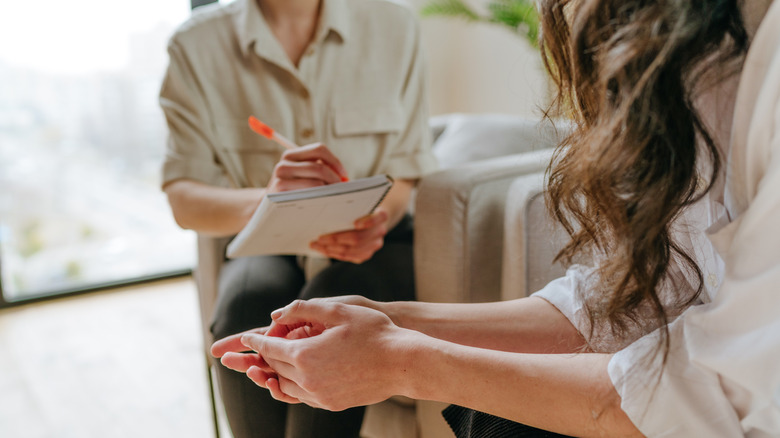How To Get The Most Out Of Therapy When It's Not Always Convenient
Therapy can bring many benefits to our lives. It can give us the space to talk about a specific problem or a recurring state of mind that can otherwise make our lives more challenging. It gives us the space to improve the relationship we have with ourselves and it can also improve the relationships we have with others, be those familial, romantic, or work partners. According to the American Psychological Association, approximately 75% of people who begin therapy notice an improvement in their lives. Those are some good statistics.
But therapy isn't always easy. First of all, it can bring up overwhelming feelings as we confront difficult truths about ourselves or unearth memories that we've forgotten about. As the old saying goes, sometimes things get worse before they get better. There are other factors that make therapy challenging. In a busy schedule, it can be daunting to try to carve out consistent time to meet with someone. On top of that, our sessions can bring up their own hurdles. While a Zoom appointment or a therapy call might reduce travel challenges, they can also present their own struggles. We're suddenly talking about core wounds in our living rooms. If we're meeting our therapists in person, that can present other challenges, like making the time to get to the location and how to process the appointment afterwards, while we're setting off to our next task. With all of this in mind, here's how to get the most out of a therapy session when it's not convenient.
How to navigate therapy around work and other commitments
Let's be honest. Most of us don't have the luxury of a wide-open schedule that allows us to dedicate a lot of time to therapy. For many of us, therapy appointments happen in the midst of myriad other commitments that we have to juggle. Right off the bat, as we're considering therapy, we need to look at this and see if there's a time that works best. Marriage and family therapist Christine Scott-Hudson said, "Choose the right time of day for you to feel alert and ready to process deep feelings. For example, you don't want to choose to see your therapist when you have to rush back to an important office meeting" (via Apartment Therapy).
While this might be ideal, sometimes it's hard to carve out that kind of time. Psychologist Smruthy Nair told Refinery29 that scheduling a therapy appointment at the beginning or end of a workday works well. If the appointment happens to fall over our lunch breaks, Nair suggested having a specific place to have the appointment can help.
Nair also suggested practicing communication around our other commitments to alleviate the potential inconvenience of therapy. "Your boss or manager doesn't have to know what you're actually doing in therapy, [you can just] say that it's a psychologist or therapist appointment without feeling that shame or guilt about helping yourself [because] it is a serious appointment," Nair explained. This way we can prioritize our mental health while still keeping up at work.
Hold time for what happened in therapy outside of the session
As we juggle therapy with the rest of our lives, it can sometimes be challenging to make the most of the session, especially if we have other commitments hot on the heels of our therapy appointment. There are a few tricks to keep the benefits of the therapy session with us after it's finished.
Counselor Sana Powell told The Washington Post that one of the best ways to get the most out of therapy, especially with a lot else going on, is to hold space for the session during the rest of our week. "You have to do the work between sessions to really solidify and process everything," Powell said. We're learning new behaviors and paying attention to old patterns, and this comes up while we're living our lives. So even if our therapist doesn't give us actual homework, we're going to have some work to do between sessions.
So what else can we do to maximize the time between sessions? Take notes. Therapist Houyuan Luo told PopSugar that taking notes to prepare for the next session is an excellent way to come prepared with field work. We can also take notes during therapy sessions to jot down insights. It's also an excellent practice to write down the main ideas immediately after our session has concluded, so that we can marinate in the big takeaways. All of this helps us continue the benefits of therapy in our lives.
Know that the therapy process is nonlinear
If our current therapy schedule isn't convenient for us, it can become even more tempting to jump ship, particularly as we start to unearth difficult things. After all, it can start to feel like one more thing, and a tough thing at that! But this isn't always the best instinct. Sana Powell said in The Washington Post that therapy doesn't mean an instant and steady improvement in our lives. Instead, therapy is a bit more raw and gritty than that. "Sometimes you'll leave the session feeling relieved," Powell said. "Other sessions dredge up things from your past. It's not always going to feel good. It might feel like you're taking a couple of steps back sometimes, but that's part of your growth process."
Marriage and family therapist Lisa Olivera told Apartment Therapy, "Know that things might get harder before they get easier. Opening ourselves up to our feelings, emotions, and experiences can be painful." This is a useful truth to hang onto, especially in moments where therapy seems to be too much work and too inconvenient. Don't be afraid of what comes up and stay consistent with appointments, while making sure that we're able to take care of the rest of our lives around our therapy, because the rest of our lives will become better thanks to therapy over time.



